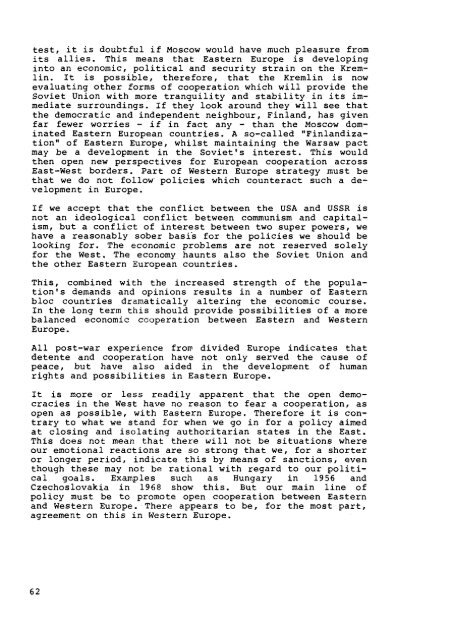Ifda dossier 47, May/June 1985
Ifda dossier 47, May/June 1985
Ifda dossier 47, May/June 1985
You also want an ePaper? Increase the reach of your titles
YUMPU automatically turns print PDFs into web optimized ePapers that Google loves.
test, it is doubtful if Moscow would have much pleasure from<br />
its allies. This means that Eastern Europe is developing<br />
into an economic, political and security strain on the Krem-<br />
lin. It is possible, therefore, that the Kremlin is now<br />
evaluating other forms of cooperation which will provide the<br />
Soviet Union with more tranquility and stability in its im-<br />
mediate surroundings. If they look around they will see that<br />
the democratic and independent neighbour, Finland, has given<br />
far fewer worries - if in fact any - than the Moscow dom-<br />
inated Eastern European countries. A so-called "Finlandiza-<br />
tion" of Eastern Europe, whilst maintaining the Warsaw pact<br />
may be a development in the Soviet's interest. This would<br />
then open new perspectives for European cooperation across<br />
East-West borders. Part of Western Europe strategy must be<br />
that we do not follow policies which counteract such a de-<br />
velopment in Europe.<br />
If we accept that the conflict between the USA and USSR is<br />
not an ideological conflict between communism and capital-<br />
ism, but a conflict of interest between two super powers, we<br />
have a reasonably sober basis for the policies we should be<br />
looking for. The economic problems are not reserved solely<br />
for the West. The economy haunts also the Soviet Union and<br />
the other Eastern European countries.<br />
This, combined with the increased strength of the popula-<br />
tion's demands and opinions results in a number of Eastern<br />
bloc countries dramatically altering the economic course.<br />
In the long term this should provide possibilities of a more<br />
balanced economic cooperation between Eastern and Western<br />
Europe.<br />
All post-war experience from divided Europe indicates that<br />
detente and cooperation have not only served the cause of<br />
peace, but have also aided in the development of human<br />
rights and possibilities in Eastern Europe.<br />
It is more or less readily apparent that the open demo-<br />
cracies in the West have no reason to fear a cooperation, as<br />
open as possible, with Eastern Europe. Therefore it is con-<br />
trary to what we stand for when we go in for a policy aimed<br />
at closing and isolating authoritarian states in the East.<br />
This does not mean that there will not be situations where<br />
our emotional reactions are so strong that we, for a shorter<br />
or longer period, indicate this by means of sanctions, even<br />
though these may not be rational with regard to our politi-<br />
cal goals. Examples such as Hungary in 1956 and<br />
Czechoslovakia in 1968 show this. But our main line of<br />
policy must be to promote open cooperation between Eastern<br />
and Western Europe. There appears to be, for the most part,<br />
agreement on this in Western Europe.
















